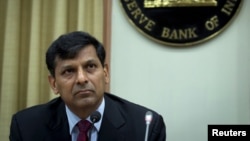An Indian banking official said the financial crisis in Greece will not have a great impact on New Delhi's economy, which has picked up momentum in the past year.
The optimistic projection came as global rating agency FITCH said it expects India’s growth to surpass China’s this year for the first time since 1999.
Indian Reserve Bank Governor Raghuram Rajan said India should not suffer from the crisis in Greece, partly due to its record-high foreign exchange reserves of about $ 355 billion and partly because it has very limited exposure to the European country in terms of trade and investment.
“Our sense is that after the initial burst of volatility, which undoubtedly there might be if developments turn adverse, that investors will start differentiating and when they start doing that, they will see that the India story is actually a very good one, continues to be a good one, and that we not only have good macro policies in place, but growth prospects are quite healthy when compared to the rest of the world," Rajan said.
Rajan’s word carries weight not only because of his position as the central bank governor, but as a former International Monetary Fund economist who is widely credited with correctly forecasting the 2008 global financial crisis -- warnings that IMF chief Christine Lagarde said earlier this year should have been heard.
Optimistic about growth
The global rating agency FITCH also is optimistic about India's growth prospects. Its global economic outlook released this week marginally lowered the country’s growth forecast for the current fiscal year from 8 percent to 7.8 percent.
Despite this, it said India's growth will overtake China for the first time in about 15 years.
India’s one-year-old government is trying to catapult the economy to a faster trajectory to fulfill its core promise of making India an economic powerhouse and creating jobs for millions of young people.
However, ratings agencies such as FITCH and Moody’s continue to warn India about the sluggish pace of change.
In recent months, Prime Minister Narendra Modi’s government has been struggling to build political consensus around key reforms relating to land, labor and taxes, and many fear that this could slow growth.
